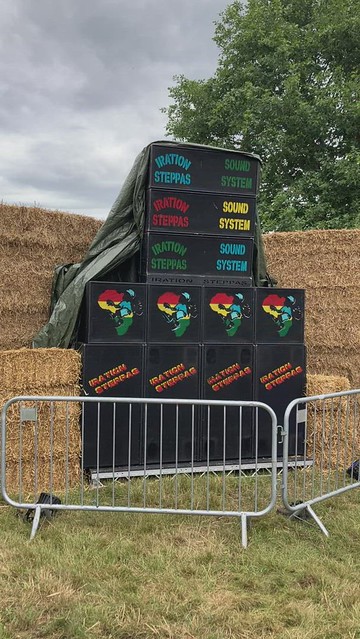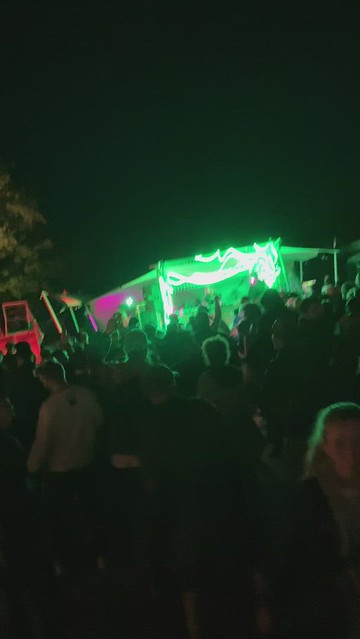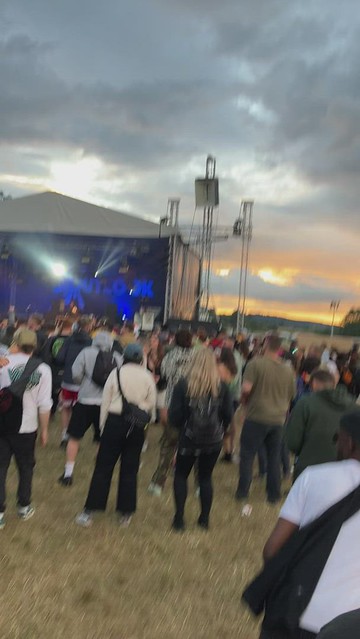I have an American perspective, so the things that I found novel may not even resonate or make sense to the brits.
It was like a weird dream for me to see this scene in person, thriving, listening to the same music I started listening to 14 years ago, just me and some college friends listening to Sub FM when it felt like no one knew about it. Obviously, people have always known this music - the UK has a whole history of rave and drum and bass going back further than my perception, but in the US, most "music people" treat any form of electronic dance music as low-brow, or low-effort. Not as an art form. Somewhere down the line, giant portions of the American population forgot how to dance. I believe if no one's dancing to your music, you're doing the music wrong!
In the states, a few people have heard of Goldie, and probably more for his relationship with Björk than what he represents.
There were Jamaican flags everywhere, people drinking Red Stripe, jamaican themes throughout the festival, obviously through the connection of Dub music and the Windrush generation. It's somewhat disconnected from the modern dancehall of new york or jamaica.
This is a social music scene that must be experienced in person, and it can feel at times it's about even more than just the music. Similar to our American scenes in grunge/punk rock, hip-hop etc. Seeing Bailey at 3am in a tent in Cheshire on a proper soundsystem, or the audio/visual experience of 100 or so people dancing to a dub riddim between a bunch of hay bales. It's not even about the music anymore, it's about how we relate to each other as people. Bass connects all of these, as the central part of all of this music.
Why do people make music? Is everything we make artificial? From the sound of our voice to waves from a speaker, you can call it all man-made. These artificial sounds of drums and bass sound completely natural in a field overlooking an ancient castle. Even though it was produced in a studio, there's a feeling that this is how the sound was meant to be heard.
Loud music sounds different on a good soundsystem in the UK. I've seen plenty of music in the states that just hurts your ears - way too much treble, you can't even have a conversation. That's the first thing I noticed when I came to London in 2017 and went to some rooftop parties in Brixton and Dalston.

The shared connection between performer and audience was top-tier during the daytime sets.

And every night, the mood shifted, generally to something darker, more lunar and drum-n-bassy. But depending on your stage (whichever sounds you followed) you could always find the right vibe, like this classic piano-driven rave tune from Naina with rolling drums, the moment I felt like I finally understood what Burial meant when describing these drums as "the UK sound", associated as much with melody as rhythm:

Followed by Kode9's experiments on the dancefloor, or... the field.

I heard a few murmering complaints about the bleed-over of sound between the eight stages, but being able to follow the bassline into a new scene was a central part of the festival. Once completely enveloped, I never found myself distracted by sounds coming from elsewhere - well, unless I was at the Sinai soundsystem - they unfortunately had some well-known issues over the weekend. This co-existence (or chaos, if you're a glass-half-empty person) of sounds is how it should be - just like the streets of New York.
My favorite memory? Waking up at 6am, last night of the festival, freezing cold in my tent cause I forgot to bring blankets (it doesn't cool off at night in New York), it's already light out, and some people who've been up all night are singing along to "Better Off Alone". Then I somehow fell back asleep.
Flickr album: https://flic.kr/s/aHBqjzX6dV

